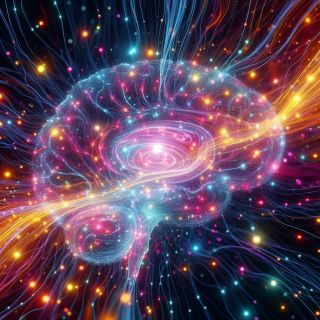Dopamine
Dopamine: The Motivation Drug We're All Hooked on
Our brains addict us to what feels rewarding via our dopamine drive.
Posted April 2, 2024 Reviewed by Michelle Quirk
Key points
- What drives the release of dopamine is unique to everyone but essential for peak performance and learning.
- Optimal motivation requires dopamine regulation because too much dopamine can be nonproductive and harmful.
- Avoiding excessive dopamine spikes promotes optimal motivation.
We all know what it feels like to be motivated—that sense of eager anticipation and potent drive that propels us into action. Feelings of contentment or euphoria often accompany our peak motivational states. But what is the underlying basis for this quintessential human experience? Research increasingly points to dopamine, a neuromodulator that plays a key role in motivation, reward, and getting you off the couch.
At its core, motivation arises when dopamine neurons fire in response to what feels like a personally rewarding experience (Schultz, 2015). The key emphasis here is on “personal” because rewards and the corresponding dopamine drivers for one individual may not be the same for another. As such, we elevate dopamine production in a variety of different ways. For some, engaging in a challenging task is sufficient enough. Others need more, like food, sex, exercise, and even winning a simple game to pull the dopamine trigger. All of these behaviors can elevate dopamine production depending on the individual. Artificial and physically addicting sources of heightened dopamine states include the ingestion of dopamine-promoting substances like caffeine, amphetamines, or dopamine supplements. Regardless of the source, it’s the dopamine that gets us going.
Overindulgence backfires
But too much dopamine can have the opposite effect—demotivating us and impairing our ability to self-regulate. This is the dopamine overload state that characterizes addiction (Zald, 2023). With surging dopamine levels hijacking the reward system, seemingly mundane rewards like food, sex, and social interactions begin to pale in comparison. We lose motivation for these previously compelling reinforcers as the brain myopically fixates on procuring the dopamine-spiking substance.
Dopamine transmissions don't actually encode the reward itself, but rather the anticipation and pursuit of potential rewards. The thrill of the chase and anticipation of the outcome is what initiates the dopamine production. The relationship between dopamine and motivation follows an interesting inverted-U-shaped curve. When dopamine levels sit at typical baseline levels, we experience normative levels of motivation—enough to pursue rewards, but not an excessive drive. However, as dopamine levels rise from baseline, so does our motivation (Lerner et al., 2021). Moderation is the key to consistent motivation.
Numerous examples illustrate both the motivating and de-motivating effects of dopamine dysregulation. Consider the following:
- Compulsive gaming: The thrilling auditory and visual reward cues of video games are powerful instigators of dopamine release. As we chase each level and unlock achievement badges, the motivation to keep playing intensifies (Weinstein et al., 2017). However, when taken to an extreme, gamers lose interest in other aspects of life—hygiene, socializing, work/school—as the brain becomes overstimulated and desensitized by these supernormal dopamine flows.
- Obesity: The dopamine-driven reward and motivation systems are exquisitely tuned to find calorie-dense foods rewarding, an adaptive trait for ancestors living amid food scarcity. But with modern processed foods carefully engineered to hyperstimulate dopamine firing, we can become trapped in cycles of craving and overconsumption (Kelly et al., 2022). The motivational pull of these obesogenic food cues prompts us to eat for pleasure rather than hunger, driven by a dopamine-mediated urge to indulge.
- Behavioral addictions: Not just substance addictions, but behavioral addictions like gambling, compulsive exercise, and compulsive buying similarly reflect a dopamine-hijacked state (Lejoyeux & Weinstein, 2010). These activities produce supernormal dopamine spikes that erode interest and motivation for other reinforcers, narrowing our motivational repertoire.
So, while some level of dopamine signaling is vital for motivated behavior, too much dopamine dysregulation can be demotivating and detrimental. The "sweet spot” seems to be slightly elevated dopamine levels that give us an extra motivational boost without tipping into addictive overconsumption and apathy about other reinforcers.
Ultimately, neuroscience reveals that dopamine is pivotal for motivation, but it's a double-edged sword. Harnessed optimally, this neuromodulator drives peak motivation and enhanced goal pursuit. But too much dopamine flood disconnects us from our core drivers, leaving us demotivated and fixated on chasing that next synthetic neurochemical high. The key is keeping dopamine regulated so its motivational signal promotes thriving rather than compulsive behavior.
References
Kelly, A. L., Baugh, M. E., Oster, M. E., & DiFeliceantonio, A. G. (2022). The impact of caloric availability on eating behavior and ultra-processed food reward. Appetite, 178, 106274.
Lerner, T. N., Holloway, A. L., & Seiler, J. L. (2021). Dopamine updated: Reward prediction error and beyond. Current Opinion in Neurobiology, 67, 123–130.
Lejoyeux, M., & Weinstein, A. (2010). Compulsive buying. The American Journal of Drug and Alcohol Abuse, 36(5), 248–253.
Schultz, W. (2015). Neuronal reward and decision signals: From theories to data. Physiological Reviews, 95(3), 853–951.
Weinstein, A., Livny, A., & Weizman, A. (2017). New developments in brain research of internet and gaming disorder. Neuroscience & Biobehavioral Reviews, 75, 314–330.
Zald, D. H. (2023). The influence of dopamine autoreceptors on temperament and addiction risk. Neuroscience & Biobehavioral Reviews, 105456.



